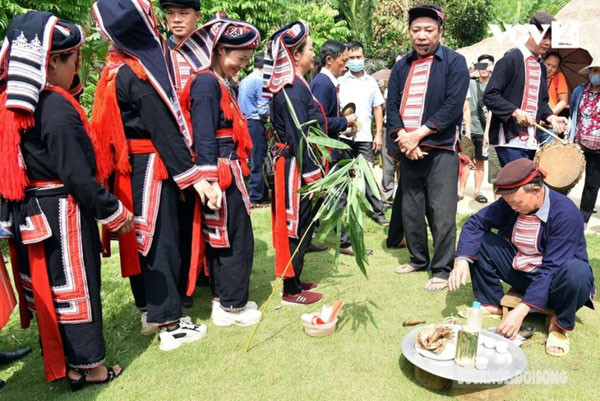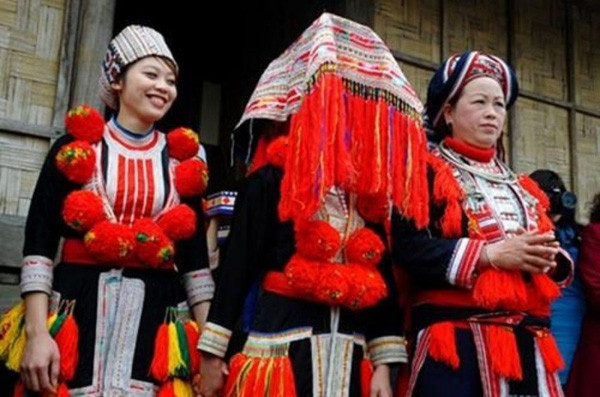
In the Dao Do community, whether it is love match or an arranged marriage, the parents must ask a shaman to compare the age of the boy and girl.
If their ages do not match, they can’t get married. If the shaman says they can become husband and wife, both families prepare for a wedding.
“The boy’s family visits the girl’s family for the proposal, engagement, and wedding ceremonies.They bring with them offerings such as chicken, pork, and some money,” said Dang Cha Chiu of Ham Yen district.
At the first meeting the boy’s family designates a matchmaker to represent them to talk with the girl’s family. The matchmaker should be a respectable and well-spoken person and have a profound knowledge of the Dao customs and traditions.
If the girl's family agrees, the matchmaker tells the groom's family to organize an engagement ceremony. They will bring an offering to the girl’s family, including pork, chicken, rice, and liquor.
Then both families prepare for the wedding.
“We ask the shaman to calculate an appropriate date and time for the wedding, which should match the age of the groom, bride, and their parents,” said Trieu Van Chien of Tan Thanh commune.
The ceremony to welcome the bride to the groom’s family has many procedures, which reflect the Dao culture and history. The wedding takes place mainly at the groom’s house. The bride’s family prepares a meal to see off their daughter.
“The wedding has been shortened to one day instead of 2 or 3 days as in the pastbut they still maintained the traditional features,” explained Pham Ngoc Hiep, who works at the Tuyen Quang provincial Culture Center.
The groom’s delegation includes a matchmaker, the groom, people carrying gifts and dowry, and a band playing trumpets, drums, gongs, and cymbals. On the way to the bride’s house, the band plays music to salute the villages they pass by.
“On the wedding day we play music to accompany the groom’s delegation to the bride’s house. The custom has been passed on from our ancestors,” said Dang Cha Chiu, a trumpet player.
”We play trumpets and other musical instruments to wish the couple a happy life forever, healthy children, and a prosperous business. We play a melody to welcome the bride and go around to the groom's house before going inside.”

At the bride’s house the matchmaker asks for permission to enter the house to conduct the wedding rites and take the bride out of her house. The bride covers her head and face with a red and black scarf.
The Dao Do believe that to protect her soul and future luck, the bride should not see the sun. The groom is not allowed to see the bride’s face before all the ancestor worship procedures are finished.
“The bride’s procession is a traditional part of the Dao wedding. The bride wears a traditional brocade costume which is delicately woven and embroidered,” said Pham Ngoc Hiep.
Arriving at the groom’s house, the bride’s procession has to wait outside until an appropriate time and the shaman performs rituals before everyone enters the house. The bride stands in front of the altar waiting for the groom, who wears a head scarf identical to hers.
For a month after the wedding, the bride remains inside the house doing housework. She is not allowed to go out to visit anyone. After 30 days the couple brings chicken, pork, and liquor to the bride’s parents.
Source: VOV5